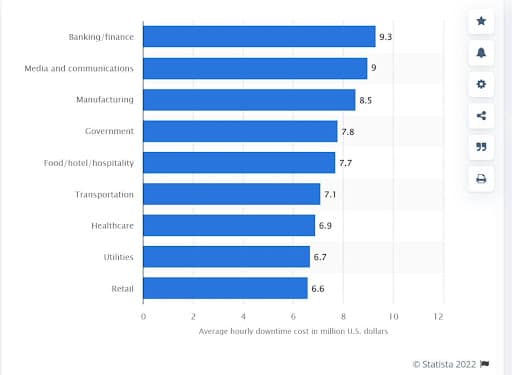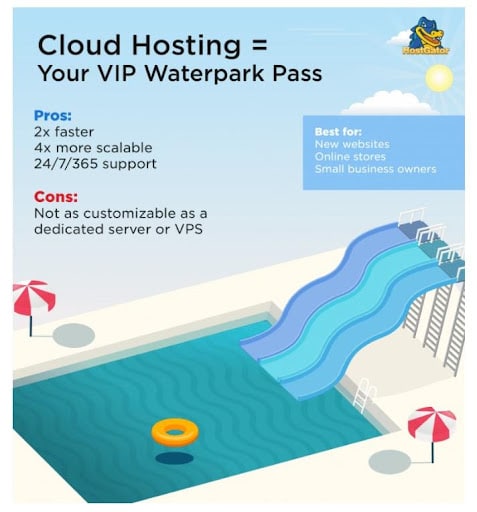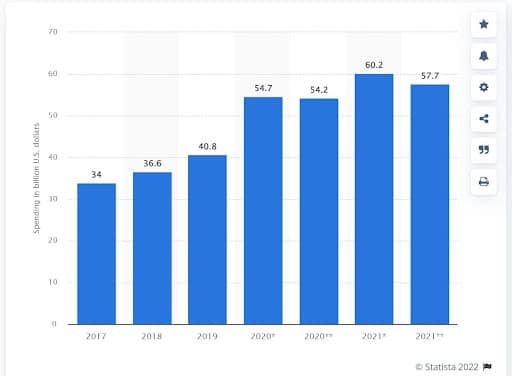Table of Contents
Last update on
This is a guest post. Opinions and recommendations are the author’s own.
Over the past two years, businesses have been busily shifting towards a more significant digital presence. While some may opt for online marketplaces or social media, forward-looking business owners look towards building their cyberspace properties.
One of the most vital parts of that infrastructure is web hosting.
What is Web Hosting?
Web hosting is a service that allows your website to be published online, making it accessible on the internet. When you purchase a web hosting plan, you’re renting a hosting space on the web hosting provider’s server(s); this is where all your website’s pages, files, media, and data are stored.
Web hosting providers provide the relevant hosting services to you. They build and maintain the infrastructure, technologies, and appropriate resources to ensure continuous secure operation and high performance of your website.
Users will key in your website address (domain name) in their browsers. The hosting server will deliver your web pages to them.
Does It Matter to Get Quality Web Hosting?
Just as you want to live in a quality house, the same applies to your website. The quality of your web hosting solution and web hosting provider greatly determines your website’s quality.

If you want success in your business, your website has to be up and running without downtime. Imagine the losses you’ll suffer when your website is down for several hours. Not only will you lose revenue, but your brand and reputation will also take a plunge.
As such, you have to go for a quality web host that offers quality web hosting solutions, with high uptime of 99.99%. You’d want your website to be available 24/7 to your customers.
Blazing Speeds
If your website is slow, you can bet your bottom dollar that your audience will not wait and leave almost immediately; this is how your bounce rate shoots up, which is a huge ‘No No’. Lowly performing and slow loading speed websites are the perfect factors that drive your potential customers elsewhere.
As such, you’d want to go for quality web hosting to enjoy an excellent performance at blazing speeds. It’s an effective way to improve the Largest Contentful Paint grade, optimize your Lighthouse score, push up your Search Engine Optimization (SEO) rankings and rake in more revenue for your business.
High Security
If your website gets hacked, it can set off a disastrous chain reaction causing massive damage. Your audience will be frightened away and rarely return. The stigma of your brand’s website filled with viruses, malicious programs, or being hacked before will follow you. Your business will fail.
As such, engage quality web hosts that ensure the relevant security measures and policies.
Regular malware scanning, deploying security plugins, regular updates, among others, must be done. Security audits assure you that your web host is doing what they say they are.
7 Questions to Ask Before Choosing Web Hosting
To help you in your journey to identify the best web hosting for you, here are questions to guide you.
1. What are the Types of Web Hosting Plan

There are several web hosting plans available in the market. Each plan suits different purposes at various prices. As such, understanding these web hosting plans is the first step to helping you land the right one for you. Here are the more popular web hosting types:
Shared Hosting
Shared hosting is the cheapest available and is most popular. Your website will share the space on the same server as other websites. Resources such as the CPU, storage drives, memory, and bandwidth are shared among these websites, keeping the costs low.
As such, if you’re starting or your website is simple, expecting moderate traffic, shared hosting could be your guy. Also, onboarding shared hosting requires minimal technical skill sets. Hence, this is perfect for entry-level website hosting.
Disadvantages:
However, since you’re sharing resources with others, your website performance is dependent on other websites’ needs. Also, if another website encounters a security breach, your website can be affected. Therefore, you should go for a trusted and reputable web host.
Best Suited For:
- Simple websites
- Personal blogs
- Small businesses expecting less than 20,000 visits a month.
Virtual Private Servers (VPS) Hosting
In VPS hosting, you still share the same server as others, but you will have an allotted space partitioned off from other websites. This is possible because a VPS hosting breaks a server down into several virtual servers. As such, you get a virtually-partitioned amount of space with your set of resources dedicated to your website.
You end up getting a ‘dedicated server’ for yourself even though you’re not paying for the whole server; this is how costs are kept low. Also, you won’t be held for ransom by other websites’ needs.
Disadvantages:
Since the allotted resources are affixed, your website may not be able to handle a sudden surge in traffic with VPS hosting.
Best Suited For:
- Businesses that have outgrown shared hosting
- Small to mid-sized e-commerce business with needs to scale in future
- Websites that require more server control with a budget
Dedicated Hosting
The most expensive type of hosting, dedicated hosting, gives you control over the whole server where your website resides; your website is the only one there. You’ll have access to large amounts of resources. As such, your website will enjoy high uptime, high reliability, and blazing speeds. Dedicated hosting is premium hosting.
Disadvantages:
Since you get all the perks with hosting, it is only natural you’re expected to pay more. In general, you are to be tech-savvy when you’re handling dedicated hosting.
Best Suited For:
- Businesses that require absolute control and maximum performance
- Enterprise websites that expect very high traffic – more than 100,000 visits a month
- Websites that need absolute top-notch security
Cloud Hosting

Cloud hosting is a group of connected servers (the cloud) hosting your website and other websites. Should your website experience a spike in traffic, the other servers will kick in to provide the extra support. As such, you can get more resources on-demand via this cloud infrastructure. Scaling a website on cloud hosting is easy.
Since cloud hosting pricing has reduced and you pay as you go, many consider cloud hosting a better alternative to VPS.
Disadvantages:
Some technical know-how is required when managing cloud servers.
Best Suited For:
- Businesses with users all around the world (your website is cached at different locations to facilitate faster loading speeds)
- Medium to large-scale websites
- Websites expecting more than 50,000 page visits a month
2. What is Your Website’s Needs and Budget?
Before head-diving into just about any web hosting plan, you have to identify your company’s business goals and marketing plans; from here, you can formulate your website’s current and future needs. Also, determine your allocated budget.
If you’re a blogger and have a small budget, you can consider shared hosting. However, VPS hosting would do your eCommerce store justice. And, if you’re in the financial business, running an operation that needs intensive resources, look into dedicated hosting.
3. What is the Renewal Fee?
When you dig deeper into each web hosting provider’s pricing model, you’ll notice that they will entice you with attractive pricing for new signups. However, this is typically only for those willing to sign up for more extended contracts. Once that expires, prices increase significantly for renewal.
Make sure you factor in the renewal rates as part of your long-term business plans. The increased prices will likely impact your budget for digital services.
4. What are the Security Features?

Especially during such pandemic times, employers are mooting for work-from-home for their employees. Security becomes the forefront of each company. While this holds for enterprises and conglomerates, this is also crucial for smaller businesses. If you want your business to flourish, your customers must have the assurance that they’re safe; they will trust you.
However, once that trust is broken, this process becomes irreversible. Hence, the essence of this question. Scrutinize the web hosting plans’ security features and the web host’s security policies. Ensure that 256-bit encryption is the minimum available and if your website accepts credit card payments, see if they offer Transport Layer Security (TLS) v1.1 or better; superior encryption to that of Secure Socket Layer (SSL).
Finally, look into the offered maintenance plan; how often they scan for malware/viruses, how often the software is updated, how often the plugins are patched, how often backups are run, and others.
5. Is There Any Support Available?
Those tech-savvy may think that they won’t need support from the web host. You couldn’t be farther from the truth; you cannot always know the exact nature of the issue or when you may run into an emergency. As such, pay attention to what support modes (live chat, email, phone, ticket system) are available and the offered Service Level Agreement (SLA).
Make sure the web host support team is available for you at least 24/7. If you’re across the other side of the globe, it is best to have 365/24/7 support. Check out their blogs, knowledge base, forums, and others; you never know when these come in handy.
Last but not least, research their average response time by reading up on credible reviews. You can have all the fancy support promised to you but are useless if no prompt and useful resolutions are provided.
6. Are There Any Additional Features Available?
Bonuses such as SSL certificate, domain name, VPN, anti-malware, and others can certainly tip the scales. If the web host includes a worthy website builder that can help speed up your WordPress site, this could be the trump card that seals the deal for WordPress site owners.
And if you’re launching an eCommerce store, you have to make sure that the web hosting plan has all the features you need – shopping cart, shipping calculator, payment processor, and others.
7. What is the Backup Schedule?
Many tend to neglect the need to do regular backups; you cannot forego this. Backups are a MUST for any website owner. You never know what and when disasters await you; when they do happen, you’ll desperately need the most recent backup to restore your website in no time.
As such, backups need to run daily, so you get all latest and updated data saved. So don’t forget to update your database too.
Before wrapping the article up: If you’re not a WordPress user, you can find specialized providers for other reliable solutions like Shopware hosting.
Summary
A significant part of digital business success is dependent on the quality of your web host. Therefore, it is wise to carry out thorough due diligence before signing up for any web hosting plan. The above questions can help you get a firm footing in your journey to choosing the best web hosting that is reliable, fast, trusted, and secure for your business.



